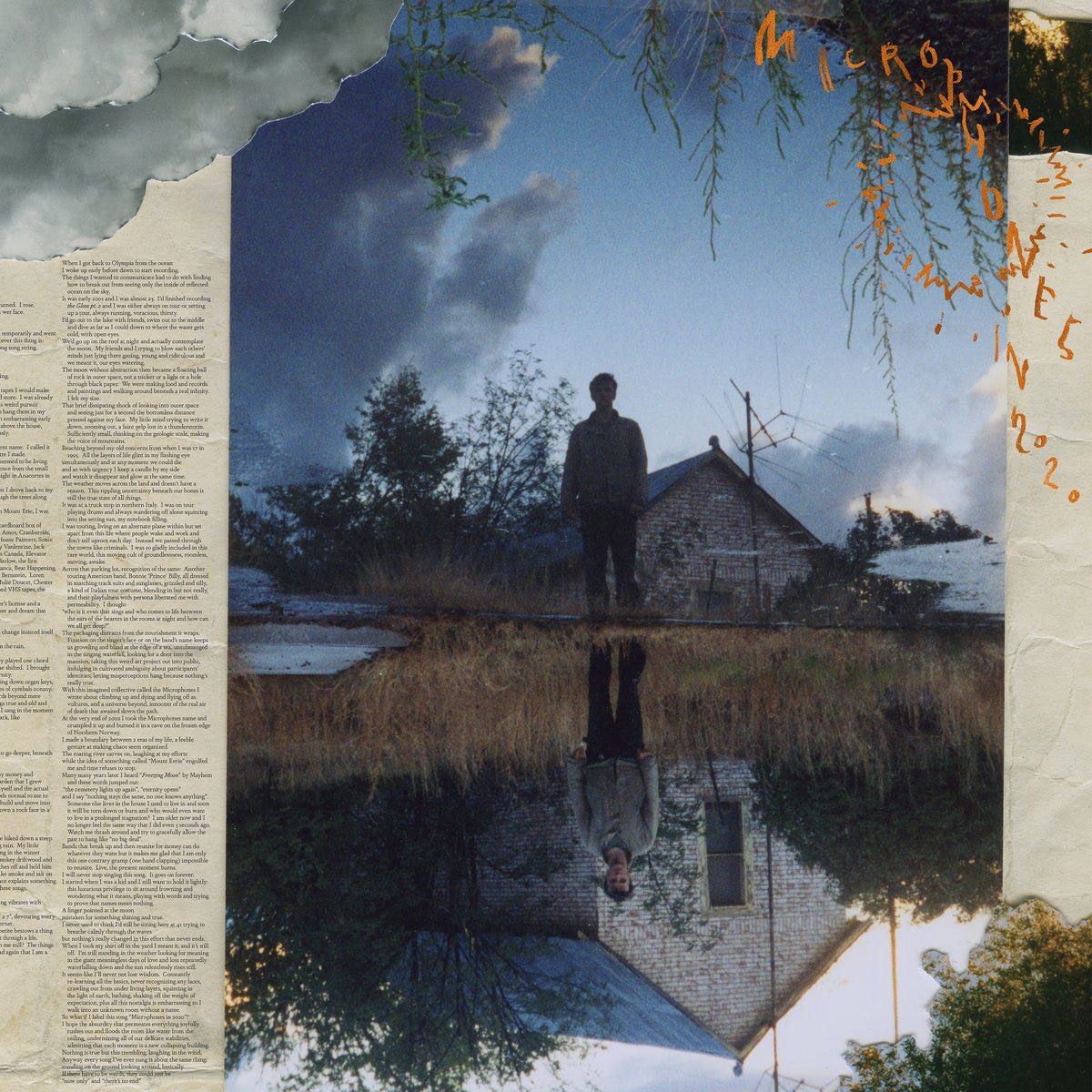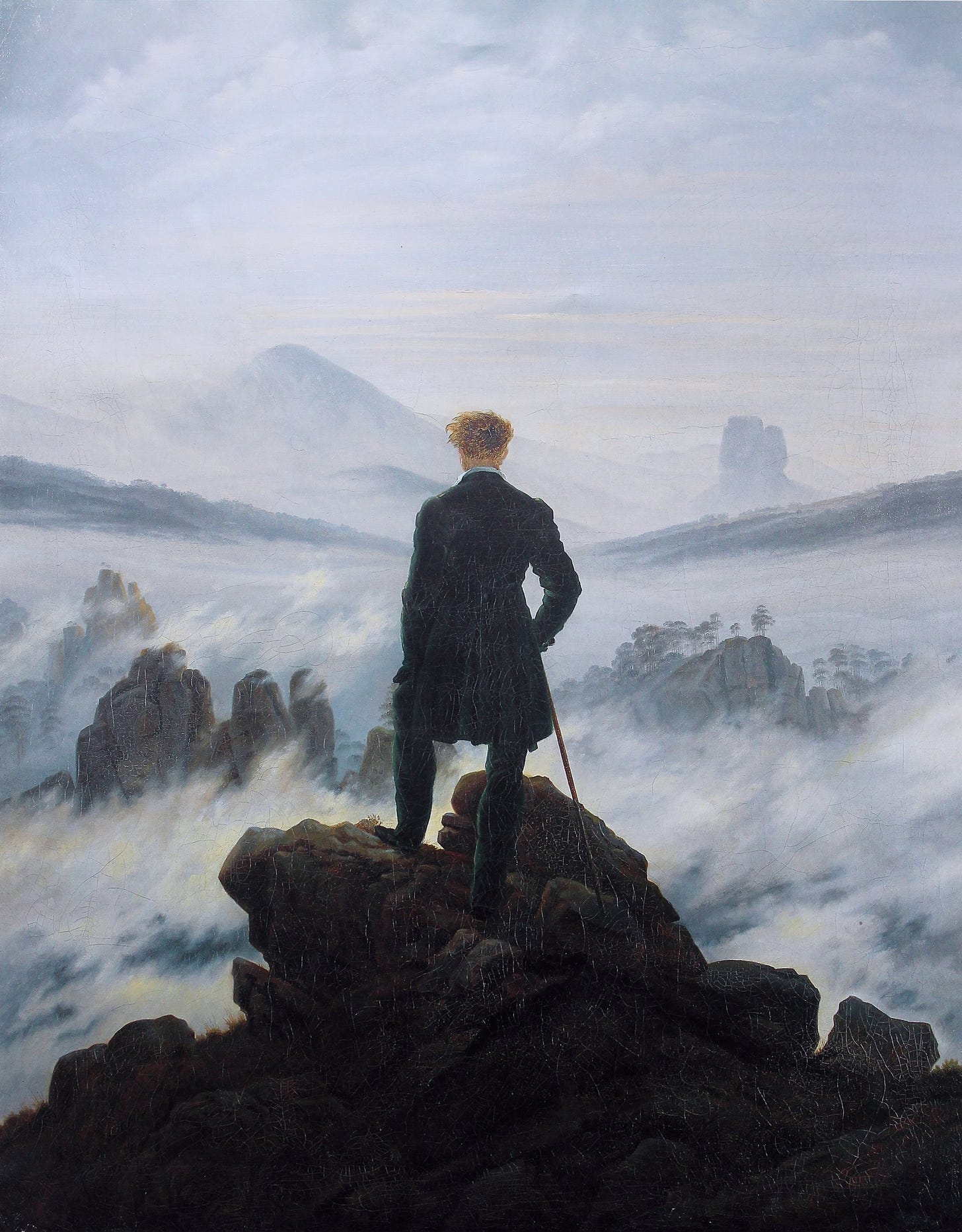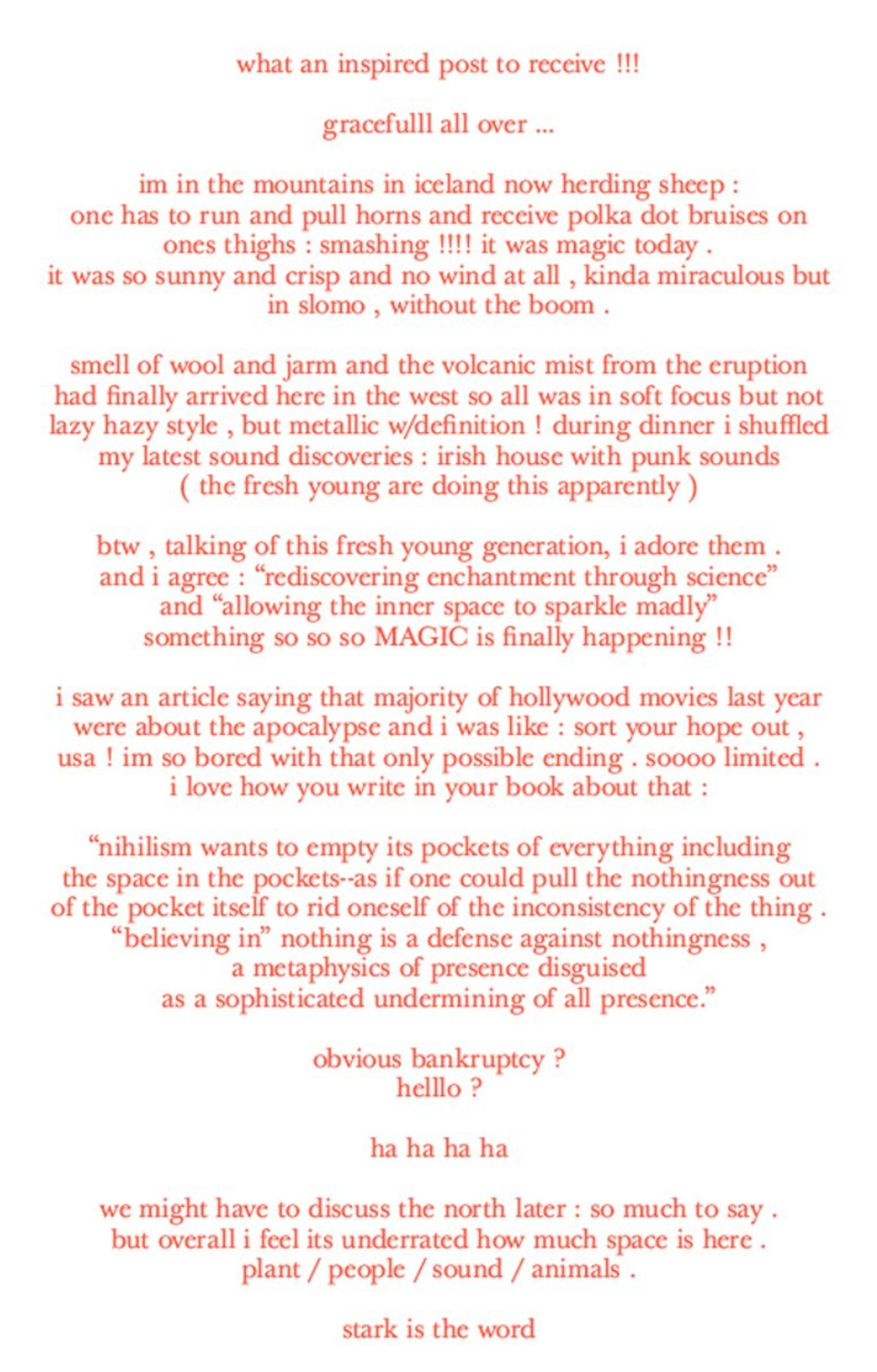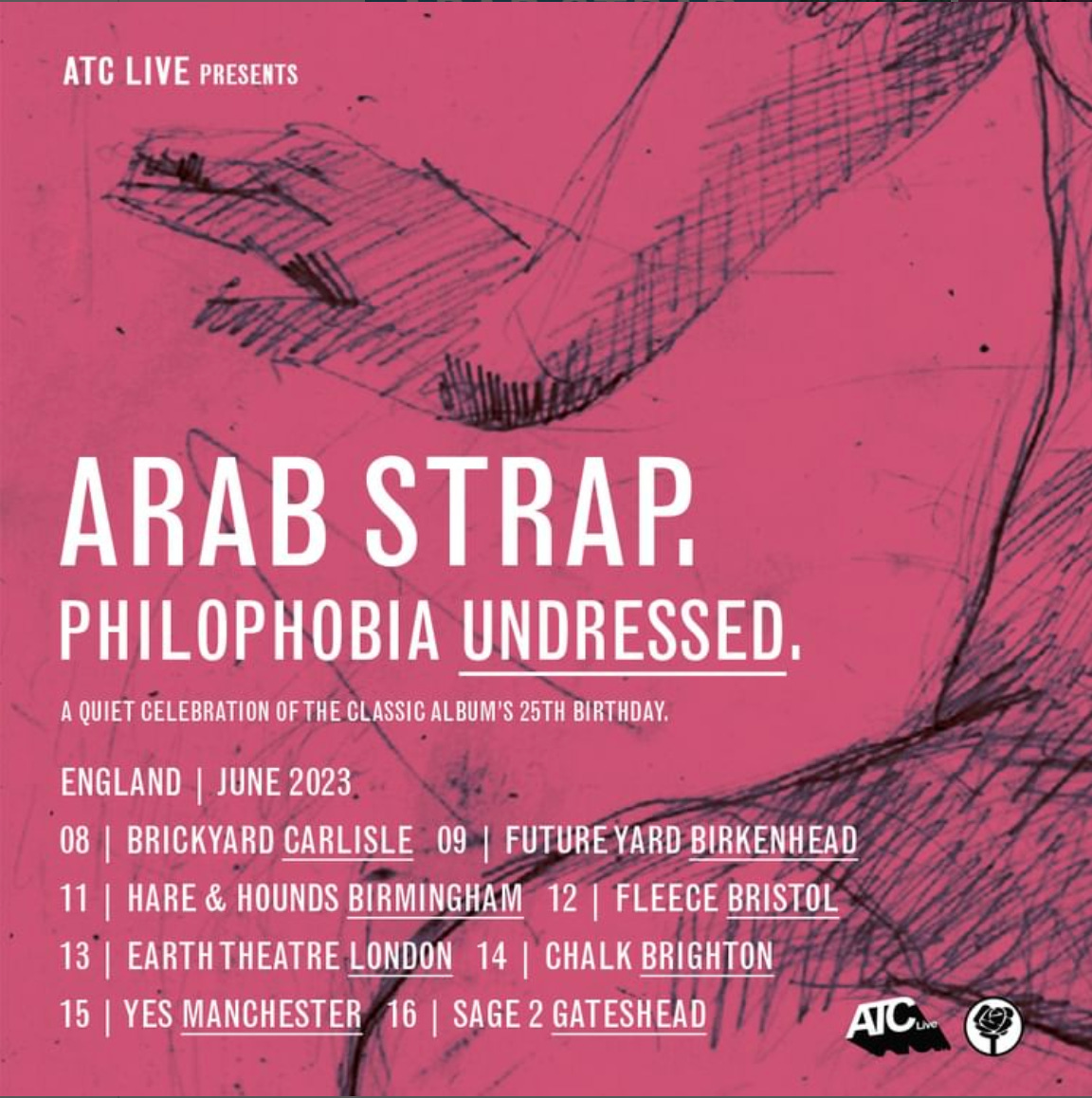'Mountains and Websites' Phil Elverum and Nature Writing + Arab Strap, Shovel Dance Collective
This week's shows, new music and more
Cantilever Recommends is a weekly rundown of London-based gigs, new releases and writing about music.
Shows this week
Mount Eerie — Grand Junction, 12 - 13.06.23
Phil Elverum aka The Microphones aka Mount Eerie (different names for his solo output at different times with no real change) has been chronicling his life and surroundings in Anacortes, Washington through folk-ish songwriting for almost thirty years. While there are plenty of music artists who are inspired by the natural world or write poetically about their surroundings, there’s something very Nature Writing in the literary sense, aka the “Robert Macfarlane Extended Universe” as Richard Smyth wrote in his article in
, about the Phil Elverum sound. The Nature Writers, so Smyth tells us, are people who love talking about nature but may love talking about how much they love it even more. On Elverum’s latest, Microphones in 2020, he self-mythologises with the best of them:“Is it because my parents barely had any money and preferred to leave the baby in the garden that I grew up to blur the boundary between myself and the actual churning dirt of this place, that it feels normal to me to speak with the voice of weather, to build and move into a mirage made of songs cascading down a rock face in a homemade myth?”
The above could have easily been written by any number of the Nature Writing acolytes and if it was you’d be forgiven for giving it a small eye-roll. This isn’t to do with whether or not it’s true but the fact that it just sounds so Nature Writing: as Smyth points out its these writers’ mimicry of one another (and attempts to out-Nature each other in a kind of Nature-loving-battle-royale) that leaves the frustrating stamp of sameiness on everyone who wants to talk about plants and soil and so on today. In music though? You’d be hard pressed to find lyrics this prose-like, or this honest, in anything that passes for ‘alternative’ (and if you can we want to know who!), which is what makes The Microphones so singular, mysterious and addictive. Are these even lyrics? They don’t look like lyrics written down…
There’s also something a bit stranger and a bit deeper than simple observations of Nature going on in Elverum’s work which reminds me of philosopher Timothy Morton’s writing. In 2015, Bjork, who also has a long history of nature-leaning lyricism and imagery, had a retrospective exhibition at MoMa where she invited Morton to contribute notes, attempting to control the narrative of the show from the outset, so as not to be pigeonholed by the art critics. You can read their whole email exchange here. Morton was profiled in the Guardian a couple of years later as “The Philosopher Prophet of the Anthropocene”.
His most famous book, ‘Hyperobjects’ from 2013, is a work of strange environmental philosophy that leans heavily on abstract metaphors and music criticism to make its points, such as the following description of My Bloody Valentine:
“When I listen to My Bloody Valentine, I do not reach out toward the sound — instead I am assaulted from the inside by a pulsation that is also sound, a physical force that almost lifts me off the floor. […] My Bloody Valentine’s singer, Belinda Butcher, places her voice on either side of the stereo image, at extreme right and left. Her voice becomes the fragile bubble container for the onslaught of glittering guitar fog from Kevin Shields. It becomes ambient (the Latin ambo means “on both sides”). We hardly hear it. It’s as if her voice contained a hyperobject, the surging, sickening slides, lurches and poundings of guitar. In this sense My Bloody Valentine’s music is more truly ecological than representational “nature” music, and more uncompromising than quiet ambient music.”
If you’ve not read Hyperobjects with its whole build up about what exactly a Hyperobject is, the final flourish here about why MBV is more ‘truly ecological’ than typical “nature” music is going to get a bit lost. That said, there’s an uncannily similar description of the effect distortion and repetition have on the writer’s way of seeing the world later on in Microphones in 2020 (which is just one quarter-hour long track by the way):
“I saw Stereolab in Bellingham and they played one chord for fifteen minutes. Something in me shifted. I brought back home belief I could create eternity. Leaning the guitar up on the amp, taping down organ keys, feeding back forever, distorted waves of cymbals ocean. Slowly starting to try to move the words beyond mere melancholy into something that rings true and old and useful hopefully, but when I was 17 I sang in the moment hurt romantically, grasping in the dark, like shadows of the moon on the back of the car seat where she sat once. It's not that bad but I know I wanted to go deeper, beneath pain, beneath the human.”
That a ‘one chord’ creates ‘eternity’ and ‘distortion’ allows us to go ‘beneath the human’ is something ‘The Philosopher Prophet of the Anthropocene’ and Bjork for that matter would be proud of. I feel the same way when listening to the opening of Mount Eerie’s Wind’s Poem (2009) which approaches Black Metal in its waves of crushing intensity.
One of Morton’s most famous bits is the idea that “There’s no such thing as Nature”, that the very idea of “Nature” sets up a way of thinking in which humans and all the rubbish we create are over here and Nature — being trees and animals and stuff — are in a separate little space over there which we can dip in and out of. Obviously this isn’t the case; every part of the world is one continuous thing, from the buildings we build to the foxes shouting outside my bedroom window to the microplastics in my bloodstream. On “Through the Trees Pt. 2 from Clear Moon (2012) Elverum summarised in an image what Timothy Morton has spent his career getting at:
“And it’s hard to describe without feeling absurd. I know there’s no other world: Mountains and Websites.”
Maybe Nature Writing needs sound to really bring it to life. Tickets
Arab Strap — EartH, 13.06.23
Arab Strap take to EartH tomorrow to perform a stripped back version of their Philophobia album in full, one of the most heart-wrenching break up albums with at least one song set in a pub the other side of A Grand don’t Come For Free. The songs on this record jump back and forward in time; they’re not about one particular relationship, but rather short stabs at uncomfortable, often sexually explicit scenarios which hit hard in all their juvenile messiness, steeped in dour acoustic guitar riffs, drum machines and slowcore textures. Tickets
Azymuth - Jazz Cafe, 17-18.06.23
Brazilian jazz legends Azymuth are probably one of the only bands consisting of three 70-somethings to have made it onto the Boiler Room channel, their synth-inflected jazz funk being pre-eminently danceable and championed significantly, in recent years, by Sam Shepard (Floating Points).
They take to the Jazz Cafe on Sat and Sun this week, joined by special guests, to continue their 50th anniversary tour despite the sad passing of drummer Ivan “Mamão” Conti in April, “honouring Mamão’s memory, legacy and keeping the spirit of Azymuth alive.” Conti’s most recent album Poison Fruit from 2019 continues to push his melding of jazz and funk further with hip-hop and experimental synth influences all over it. Tickets
Philip Glass: Music for Organ - James McVinne, 17.06.23
Many will know Philip Glass as a key exponent of Minimalism, a musical movement started in New York in the middle of the twentieth century. I’d guess that Glass is the most listened to of the three most famous of these composers – himself, Steve Reich, La Monte Young. Steve Reich’s explorations in rhythmic phasing are well-known, but many of his works centre around a rhythmic exercise that takes time to unfold, and to the unlistening ear sounds like the same thing the whole way through. La Monte Young’s works are rarely recorded by others, due to the specificity of the composer’s own microtonal performances of them. Glass, on the other hand, has written prominently for film, his pieces aren’t so long, and he seems to strive more purposefully for sounds that are beautiful, or indeed nice, than the other two.
This performance of Glass’ organ music is taking place at Bold Tendencies, the now famous multistorey car park / arts space in Peckham. I’m not sure what sort of organ will be played at this, as presumably there isn’t one installed, like at London Bridge station where you can witness many surprisingly moving scenes (see the video below). Glass used to work on a Farfisa electronic organ, and sometimes perform on them, so it’s possible McVinnie will do the same, in which case, this will be an authentic way to experience the 20thC NY vibes, probably more so than in a church. Tickets
Shovel Dance Collective - Cecil Sharp House, 18.06.23
Cecil Sharp House is the home of the English Folk Dance and Song Society, and is named after a man who, in the early 20th century, developed a music pedagogy based on English folk traditions, in opposition to Germanic ‘classical’ traditions. Cecil Sharp has been accused of the bowdlerisation of these folk sources, changing lyrics from originally bawdy or erotic songs to become more palatable for the public. It seems oddly fitting then, that Shovel Dance Collective should play their biggest headline gig to date at the building named after Sharp: the group do anything but bowdlerise; instead, they delve into English and Irish folk traditions in order to excavate radical narratives of proto-feminism and queer histories. In doing so, they represent a new wave of rediscovery of traditional music.
We’ve covered the new wave of folk revival in detail previously and Shovel Dance seem to be the best of the current London-based crop – sounding both the most ‘traditional’ at times, as well as the most experimental. Caroline Polachek agrees. Tickets.
Thanks for reading until the end - we’ve been growing quite a bit in recent weeks so please keep us going by giving this newsletter a share.









